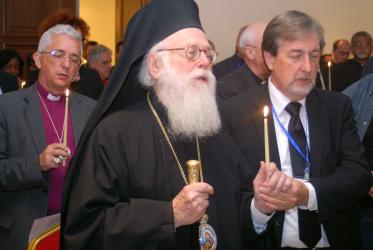Displaying 41 - 60 of 70
Rebuilding a smashed church in Albania
23 December 2015
Basel University honors Ghanian Methodist theologian
09 December 2015
WCC urges responsibility for and support to the refugees in Europe
04 September 2015
Assembly renews churches’ commitment towards justice and peace
08 November 2013
Dialogue on politicization of religion and rights of minorities
17 September 2013
Concern and solidarity for Bangladesh
17 May 2013
Women in inter-religious dialogue in Indonesia
31 July 2012












